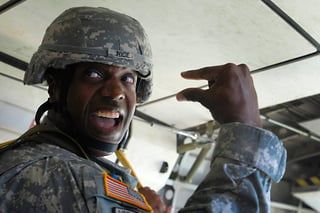Use group checks when an individual failure would mean the group fails.
First, the rules for group checks:
When a number of individuals are trying to accomplish something as a group, the DM might ask for a group ability check. In such a situation, the characters who are skilled at a particular task help cover those who aren't.
To make a group ability check, everyone in the group makes the ability check. If at least half the group succeeds, the whole group succeeds.
Otherwise, the group fails. Group checks don't come up very often, and they're most useful when all the characters succeed or fail as a group.
It is important to understand the purpose of group checks. Group checks are called for when a single individual failure would normally mean the whole group fails. This is what "succeed or fail as a group" means.
So if the whole group is trying to be quiet and not alert the enemies to their presence, and one character fails their individual check and makes a whole bunch of noise, then the group has failed, as now the enemies know that someone is here. So just use a group check.
On the other hand, I have had situations where the whole group was using stealth, but individual checks were called for. The party was being chased through a castle and ducked into a storage room. The guards saw them go into the room, but the party had a chance to hide. I had everyone roll their checks individually. In this situation, a single failure is not a failure for the whole party, only the individual. It allowed the paladin to distract the guards while the rest of the party set up for an ambush from their hiding places.
There isn't a "stealth always rolls individually" or a "stealth always rolls group checks" rule. Different situations call for different rulings. Sometimes everyone uses stealth and a group check is called for, and sometimes individual checks are called for. Using group checks when the rules say you should is quite important, as explained in the next section.
Using individual checks when a group check should be used almost guarantees failure.
Using group checks serves to make the laws of probability less punishing. When you have a party of six trying to sneak about, individual checks means you have to have six out of six successes, else the whole group fails. Group checks means you only need three out of six successes. Individual checks, when a group check should be used, almost guarantees failure, as you have observed.
Stealth often sees one character with a special job.
In my experience, I often find myself doing a group check and having one character making an individual stealth check. This occurs when the group is moving stealthily, but one character (usually the rogue) is scouting ahead or otherwise sneaking separately from the party. When this happens, I’ll have the party do a group check, and the rogue roll individually, resolving enemy perception separately for each of the checks. This way, if the party gives themselves away, the rogue can still maintain their hidden position.
This answer was adapted from my answer to a similar question: When do individual ability checks become group ability checks?

